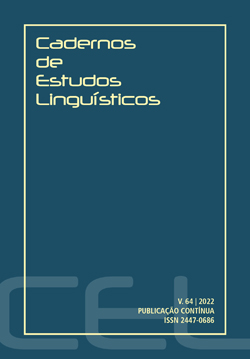Abstract
From the standpoint of a materialistic enunciation semantics, taking into account some principles from French discourse analysis, this article aimed to contrast the meanings of name per a character in Shakespeare’s Romeo and Juliet (1597) with the conceptualization of name per Guimarães (2002). In order to understand how proper names of people function within the play’s fictional world, I relied on materialistic assumptions about enunciation and meaning as developed by Pêcheux ([1975] 1995), Guimarães (1989) and Orlandi (1990, [1999] 2007). Furthermore, I sought to contemplate name bestowal in its political aspect as related to Rancière’s (2000) concept of distribution of the sensible, which, to a certain degree, partakes of the same materialistic assumptions about enunciation and meaning that can be found in Guimarães’ Event Semantics theory. The goal was, based on the combination of these theoretical propositions, to ponder on the question and statement posed in the following verses: “What's in a name? that which we call a rose / By any other name would smell as sweet” – these are words spoken by Juliet, the character, who purports that the name of the character of Romeo is but an empty label. I concluded, from the point of view of historical materialism, that the name does indeed change the rose, as Romeo, having had that name bestowed upon him (his name) and having been designated a Montague (his surname) at birth, would inevitably become part of a hostile history as a member of a family which antagonizes the family of Juliet (who is designated a Capulet, her surname). In spite of the passion that enraptures the lovers and their perceptions of each other, the conflict and the political aspect inherent to this conflict keep on, and that which is imparted through the distribution of the sensible among all those who take part in the rivalry between families has consequences not only within the young lovers’ sphere of intimacy, but also within the public sphere of Shakespeare’s fictional city of Verona, wherein the play takes place.
References
BLUTEAU, Rafael. Vocabulario portuguez & latino: aulico, anatomico, architectonico ... Coimbra: Collegio das Artes da Companhia de Jesu, 1716. v. 5. Disponível em: https://digital.bbm.usp.br/view/?45000008429&bbm/5449#page/772/mode/2up. Acesso em: 11 fev. 2020.
BRÉAL, Michel. Essai de Sémantique (Science des Significations). Paris: Librarie Hachette et Cie., 1897.
GODOY ALCÁNTARA, D. José. Ensayo histórico etimológico filológico sobre los apellidos castellanos. Madrid: M. Rivadeneyra, 1871.
GUIMARÃES, Eduardo. Enunciação e História. In: _________. (Org.). História e sentido da linguagem. Campinas: Pontes, 1989.
GUIMARÃES, Eduardo. Semântica do Acontecimento. Campinas: Pontes, 2002.
GUIMARÃES, Eduardo. Espaço de enunciação, cena enunciativa, designação. Fragmentum, Santa Maria, n. 40, p. 49-68, jan./mar. 2014. Disponível em: https://periodicos.ufsm.br/fragmentum/article/view/17264. Acesso em: 10 fev. 2020.
GUIMARÃES, Eduardo. Vocativo: enunciação e história. Entremeios: revista de estudos do discurso, Pouso Alegre, v. 13, p. 169-180, jul./dez. 2016. Disponível em: http://www.entremeios.inf.br/published/381.pdf. Acesso em: 10 fev. 2020.
ORLANDI, Eni Puccinelli. Palavra de amor. Caderno de Estudos Linguísticos, Campinas, v. 19, p. 75-95, jul./dez. 1990.
ORLANDI, Eni Puccinelli. Análise de discurso: princípios & procedimentos. 7. ed. Campinas: Pontes, 2007 [1999].
PÊCHEUX, Michel. Semântica e Discurso: uma crítica à afirmação do óbvio. Tradução de Eni Puccinelli Orlandi et al. 2. ed. Campinas: Editora da Unicamp, 1995 [1975].
PÊCHEUX, Michel. Análise Automática do Discurso – AAD-69. In: GADET, Françoise; HAK, Tony (org.). Por uma análise automática do discurso: uma introdução à obra de Michel Pêcheux. 3. ed. Campinas: Editora da Unicamp, 1997.
RANCIÈRE, Jacques. Le partage du sensible. Paris: La Fabrique Editions, 2000.
RANCIÈRE, Jacques. A partilha do sensível. Tradução de Mônica Costa Neto. 2. ed. São Paulo: Editora 34, 2009 [2000].
SAPIR, Edward. A linguagem: introdução ao estudo da fala. Tradução e apêndice de Joaquim Mattoso Camara Jr. São Paulo: Perspectiva, 1969 [1921].
SHAKESPEARE, William. Romeu e Julieta. Tradução e introdução de Barbara Heliodora. Rio de Janeiro: Nova Fronteira, 2011 [1597].
SHAKESPEARE, William. Romeo and Juliet. The Complete Works of William Shakespeare at the Massachusetts Institute of Technology. 2020. Disponível em: http://shakespeare.mit.edu/romeo_juliet/full.html. Acesso em: 7 jan. 2020.
STUART MILL, John. A System of Logic, Ratiocinative and Inductive. London: Longman, Green & Co., 1843.

This work is licensed under a Creative Commons Attribution-NonCommercial 4.0 International License.
Copyright (c) 2022 Cadernos de Estudos Linguísticos


